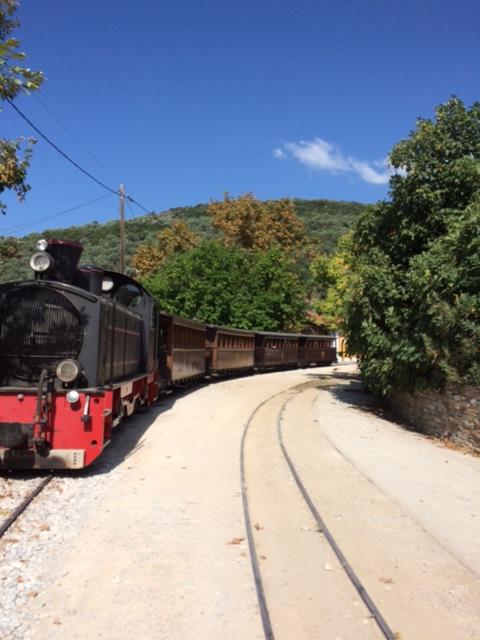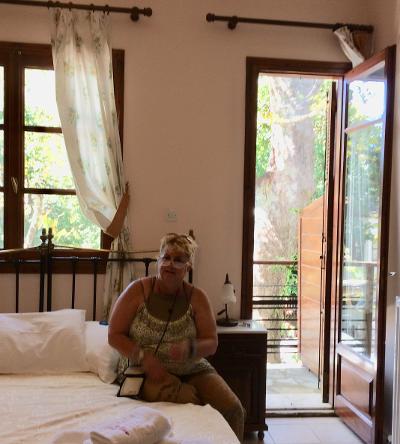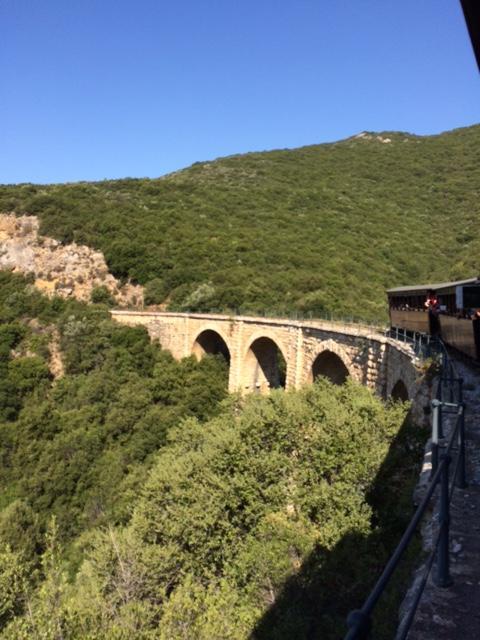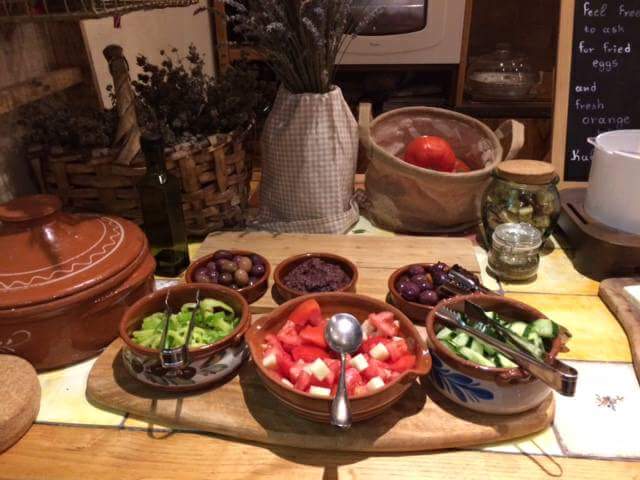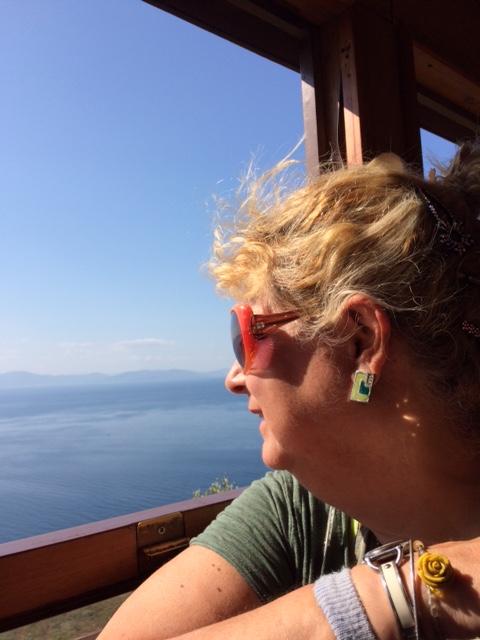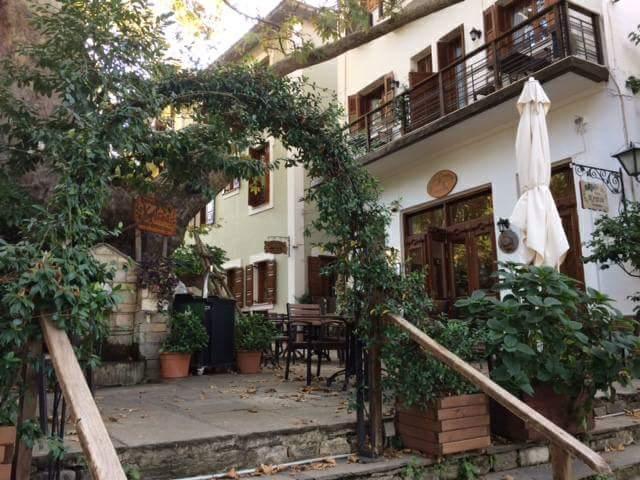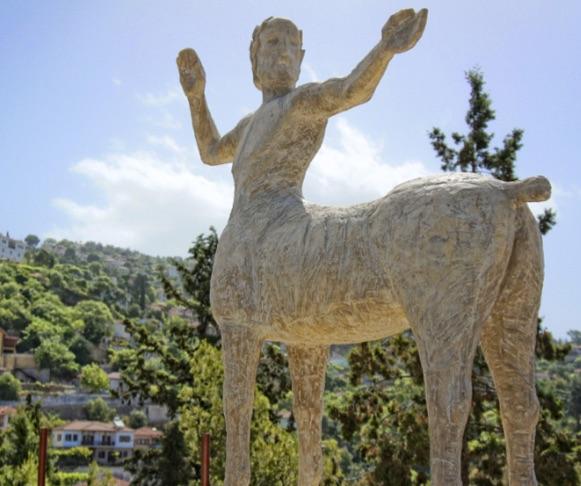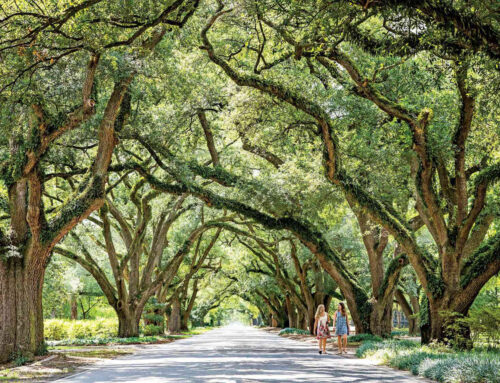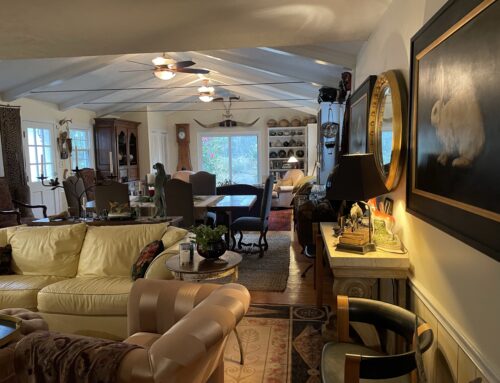Central Greece’s Magical Mountainous Village of Portaria: Walking in the Footprints of the Gods
A lesser-known destination in central Greece with skiing in winter and cozy fireplaces in some of the rooms, Portaria offers a cool respite from the hot hot Volos’ or Athens’ summer with its almost chilly mornings and evenings (bring a wrap!) and icy spring waters. One of our favorite spots in Portaria is the charmingly beautiful Kritsa Gastronomy Hotel and Restaurant (www.hotel-Kritsa.gr), right on the square, with air conditioning as well as an old-worldly quaintness, managed and decorated both with great imagination.
By Cathy H. Burroughs, International Travel Writer & Adventure Blogger
Less than thirty minutes halfway up Mount Pelion from Volos, Greece, the small city with the massive port, at the mountain’s foot, which myth claims Jason and the Argonauts passed through in search of the “golden fleece,” we found the enchanting village of Portaria. Straddling the Parasitic Gulf and the Aegean Sea, this is the land of the Centaurs where Chiron first taught the healing properties of herbs . There you can walk in the hoof prints of the Centaurs (half human and half horse) and footprints of the heroes and Gods. Here the twelve Gods of Olympus were said to languish away their summer holidays, and you, can still very much feel their presence, as you enjoy yours.
Kritsa Hotel & Restaurant
A lesser-known destination in central Greece with skiing in winter and exploring in summer, Portaria offers a cool respite from the hot, hot sizzling Volos’ and Athens’ dog days. The mountainous clime is a relief with its almost chilly mornings and evenings (bring a wrap!) and Arctic icy spring waters, drinkable from a pump positioned right outside. One of our favorite spots in Portaria is the charmingly beautiful Kritsa Gastronomy Hotel and Restaurant (www.hotel-Kritsa.gr), right on the square, with air conditioning as well as its old-worldly quaintness, both managed and decorated with great imagination. There are balconies and fireplaces in some rooms (we had a double anteroom) and it is one of the most wonderful places we’ve stayed. The uber-friendly and professional staff are beyond generous, presenting us with many surprises: an ouzo and tsipouradika pairing at the gate; iced coffees and handmade heart-shaped spice cookies, delivered to our room, after a long trek; fresh fruit as a bonus after dinner and dessert; and the newly-grown oregano spice, as a parting gift.
The restaurant (www.peliongastronomy.gr) is now quite celebrated with fruits and veg, gleaming from their organic farm which offers cooking classes. It may be unparalleled in this region, perhaps, beyond, with family recipes and positively scrumptious food at the vanguard of alternative tourism in Hellas. Their breakfast is an overflowing cornucopia of all homemade savories and sweets – a Babette’s feast for the body and soul. You’ll be wholeheartedly received at this venue with its vision of homey original Alpine decor; a hand-carved art nouveau fireplace mantel by an Egyptian sculptor; fir tree and pine cone motif prints on the walls of the lobby and eight idyllic guest rooms. Our stay was sublime, a lushly sensory delight- on all levels – and affordable enough that we could have stayed comfortably as long as we wished!
The Alchemist Hotel with Cafe
We also thoroughly enjoyed the trip down Alice’s rabbit hole at the nearby Alchemist Hotel with Cafe Patisserie (Facebook Alchemist Cafe Bistro). Their overgrown flower garden, unique one-of-a-kind rooms and Mad Hatter vibe is a secret haven. Water is served from cut-glass decanters; aromatic teas with names out of children’s books are poured from vintage tea pots into ice-filled purple goblets and specialties like lemon pie and apple tart indelibly enliven one’s taste buds.
The Centaur’s Path and Mythical Pelion Train
Do not miss the fully-refurbished, whistle-blowing, wooden-slatted, inside and out, pastoral train ride Mountzouris (www.trainose.gr). Winding its mythic way on one of the narrowest rail’s in the world, the train exhilaratingly, with open-windowed exuberance, traverses the trails of of the Centaurs and Pantheon; the location of the wedding of Pileas and sea-nymph Thetis, Achilles‘ parents; coincidentally this was the same place as the battle of the Lapiths and the Centaurs for the lovely Hippodamia.
Nestled in the gorge on the last turn before the end of its journey, lies the cave of the meritous centaur Chiron, tutor of Achilles, Hercules, Thesaus and Jason and a central figure in the Trojan War story and throughout Greek mythology. Our courageous train continues its storied curves and treacherous passes of Mount Pelion, scoring dizzying gorges, arched bridges and tunnels with vistas including Pagasitkos Bay from the tip-top of its thickly vegetated profusion of plane, pine and olive trees. Departing at 10 am from the green-shuttered, tile-floored, rustic Ana Lechonia station, the train ride is 1 1/2 hour each way, with a 15 minute rest stop at picturesque Ano Gatzea. Its destination is the traditional village of Milies, known for its apple trees, with its customary guesthouses, taverns, marble fountains, basilica, and one of Greece’s oldest steep-staired library with its four thousand rare book collection and folk art museum. Throughout this fetching town, you can follow the perilous stone footpath of some of Greece’s most courageous heros and founders of the Neo-Hellenic Enlightenment movement. We did not get to see the illustrious cave or old mansions the town is renowned for.
Nearby is Vizitsa, another village, with its Turkish villas, and, in the other direction, the “balcony of the Pelion,” Makrinitsa with really good restaurants, down steep river rock inclines, delivering the areas most thrilling views in a place where thrilling views abound. Spend an afternoon climbing the captivating and truly mystical Centaurs’ Path as it snakes around its wooded watery torrents and water falls at Karavos and hand-built bridges, leading to the spring fountain of Spring Mana where centaur and fairy glimpses are regularly reported. As we wended our way back to town we stumbled upon a miniature ancient church where we lit a candle in thanks for our manifold blessings and could actually sound the bell by pulling a long rope!
Also found but sadly we never made it to fabulous beaches (Papa Nero, Agios Ioannis and Plaka) under an hour away (the beaches of Zagora are renowned). Nor did we make it to the exquisite surrounding islands you can reach departing from the Volos port reach the islands of Skiathos, Skopelos and Alonnisos where homeopathy is taught at the International Academy of Classical Homeopathy – good for day trips or longer.
In the Portaria town center are terrific gift emporiums and Myrro Herbs (www.myrro.gr), a completely beguiling dispensary of dried teas and healing tinctures in a dreamy, luminous shop that would have made Chiron very happy, no doubt. Portaria is a magical region, not frequently visited by non-Greek travelers, and one of our all time favorites, and I mean, of all time!
International travel and culture writer Cathy H. Burroughs reports from the road as she discovers regions of Greece less traveled, then on to Spain and Portugal.

